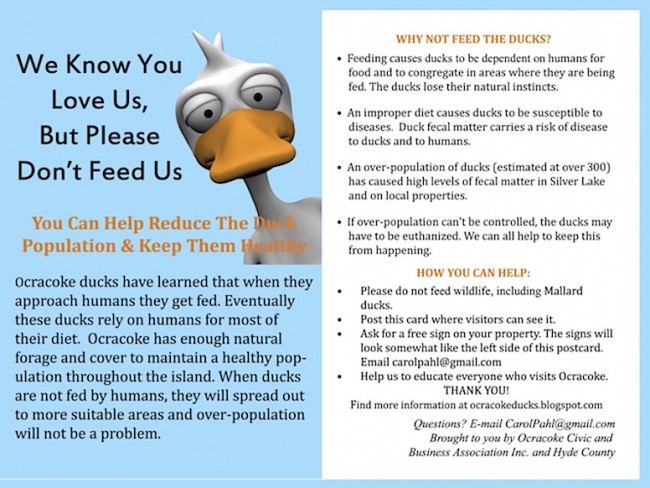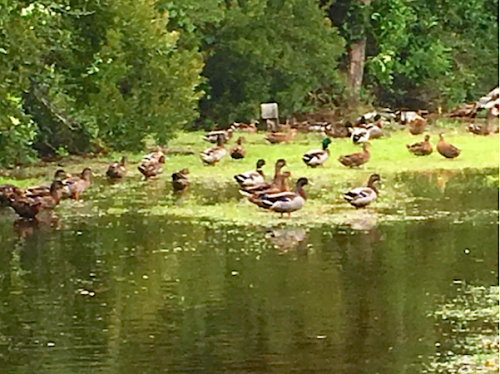Ducks Limited
In the wet and puddly days that followed TS Hermine, the Ocraducks were living it up in backyard ponds and storm-soaked temporary waterfront property. The neighborhood flock that had seemed a bit more sparse this summer, was out in its full-feathered glory. Where had they been hiding? I actually had visitors ask me, in sad and disappointed and sometimes accusatory voices: what had happened to all the widdle duckies? Oh, they're around, I said, out loud, reassuringly, while in my head I hope they'd taken wing to that great puddle in the sky. But September showers brought them back – with a vengeance. Along British Cemetery Road, in the area between the Anchorage Inn and the corner of Back Road, I counted over 100 mallards this evening. Five of them were downy ducklings. What the duck!?!
Which reminds me.... 'way back in the spring, the island scuttlebutt was all about ducks and what to do about them. We had duck meetings, and duck seminars, and duck petitions, and published duck articles. The island even appointed a duck czar (Carol Pahl) to help educate Ocracoke residents and our visiting public about the waterfowl fouling our roads and water.
Due to Carol's efforts, this postcard was mailed to island boxholders over the summer.

The idea to send the postcard came out of all the meetings about ducks.
I recently talked to Carol about the current state of the re-ducktion process.
"The next step is to get signs up," she said. Signs around the village will remind visitors not to feed the fowl. The county does have permission to euthanize up to 350 ducks, but, Carol says, no one really wants to do that. Think of it as a very, very last resort. The hope is that if people stop feeding them, the ducks will disperse on their own.
"I think it seems better, the ducks might be thinning out," Carol said. "They seem to be spreading out around the village now that some of the feeding has stopped."
Carol is interested to see what the winter will bring. In the spring, Ocracoke has permission to get the state wildlife people to come back and oil and addle the eggs.
Which reminds me.... 'way back on May 4th, OCBA hosted an information session with Dr. Maria Palamar, NC State Veterinarian, her team and representatives from the USDA Animal and Plant Health Inspection Service.
Crystal attended that meeting and wrote the following, and I ducked up by not posting it right away. (Thanks for your patience, Crystal!)
The open-house style meeting to discuss the ducks of Ocracoke went quite well! I primarily spoke with two people from the North Carolina Wildlife Resources Commission who answered a variety of questions and posed some solutions to the duck concerns plaguing the community. The topic is quite hot and the community has people who think the ducks should euthanized now, while others think the ducks should be left alone. Business owners have expressed frustrations over the daily clean-up of duck feces they have to do to maintain clean parking areas and pathways, while other residents think the ducks should be left alone and haven’t caused and won’t cause any problems. One thing everyone has seemed to notice is the amount of ducks that are regularly run over by vehicles and killed. That has also caused a heated debate: is someone or multiple someone’s intentionally running them down, or are there just so many ducks that motorists can’t avoid hitting them?
My first round of questions were about potential health risks ducks pose to humans and other animals. A variety of people have made claims that ducks carry worms or diseases, and quite honestly I was skeptical to the severity of any sicknesses the ducks could pass on or accuracy of these claims.
Luckily, Wildlife Veterinarian Maria Palamar, DVM, Ph.D. was there to address this topic. She said that ducks can potentially pass along pathogens through their feces, which could lead to a variety of sicknesses, and various bird proteins have been identified as antigens which can cause allergic reactions. The likelihood of contracting a sickness or having an allergic reaction depends on direct contact with fowl excrement. For example, children playing in grassy areas that ducks frequent might be at a higher risk of contracting a sickness if they touch any excrement, do not wash their hands well or at all, then put their hands in their mouth or handle food. You won’t get any duck-caused sicknesses through airborne transmission, though, so there is no need to worry about breathing in anything foul (get it?).
I also asked about how duck feces could impact the water quality of Silver Lake, as this concern has been mentioned by some of the residents. Chris Tucker, a Wildlife Biologist with the North Carolina Resources Commission, explained how the nutrient-rich duck feces can lead to overgrowth of algae in standing ponds or lakes. Some of the canals that don’t see a lot of water movement could also have this problem. Algae can cover large areas of standing water, which can alter marine ecosystems, causing underwater vegetation and marine animals to die off.
So, how can we decrease the duck population and prevent the spread of pathogens from duck feces? Running them over and killing them with vehicles isn’t a good option because it’s cruel and there are carcasses left rotting until the NCDOT is able to dispose of them. Some residents have suggested a massive in-village duck hunt and community duck roast, but since hunting within the village isn’t allowed, this isn’t a viable option either. Both Turner and Palamar said the best way to prevent these wild birds from being dependant or continuing to be dependent on humans is to stop feeding them!
Hyde County has gotten the permits needed to euthanize many or all of the ducks, but several other actions can be done before, making euthanasia a last resort. The first and easiest step is to cease feeding them and encourage neighbors, friends, visitors, etc. to also stop feeding them, too.
People are well-meaning when they feed the ducks; however, now that information and circumstances are out there which prove feeding wildlife isn’t good for anyone, it’s time to do what’s best for both the ducks and the community. Some folks here have put up fencing and other barriers to keep the ducks out of their yard, forcing them to find other sources of food; others chase them off their lawns. Now, the flocks usually seen around British Cemetery Road and Back Road area have likely moved to other spots around the village (they are still being run over and killed, though).
Another option is to addle or oil the eggs so future duck generations are prevented from even hatching. This can be done by obtaining a permit. The permit will allow the carrier to humanely destroy eggs on his or her own property, but he or she cannot legally destroy nests located on another person’s property.




